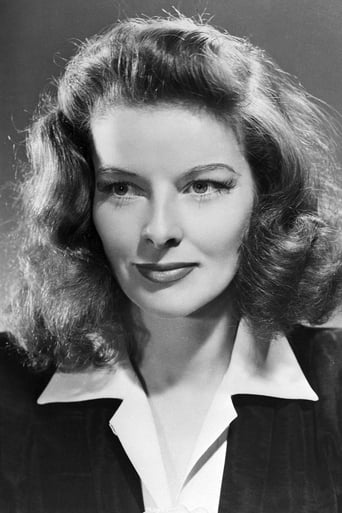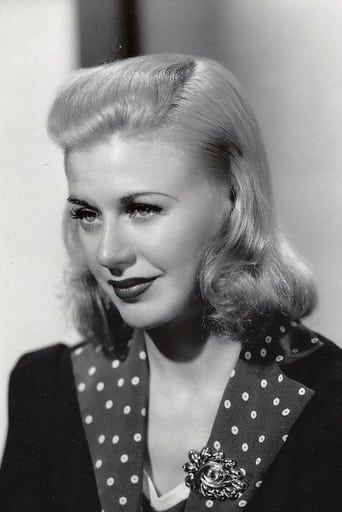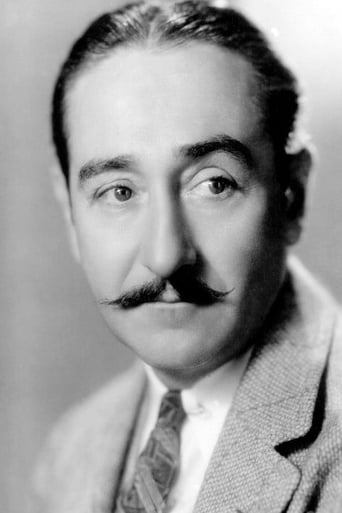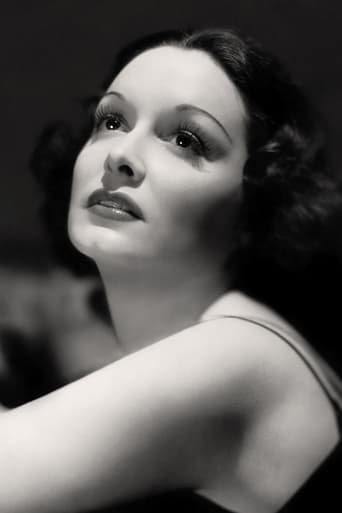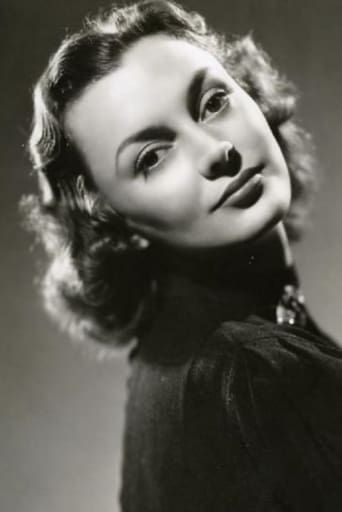Evengyny
Thanks for the memories!
Rijndri
Load of rubbish!!
LouHomey
From my favorite movies..
Fairaher
The film makes a home in your brain and the only cure is to see it again.
vert001
I don't understand why STAGE DOOR isn't better remembered. Even modern politics would seem to work in its favor. As for its competitors as a female bonding film, there wouldn't seem to be that many: THE WOMEN and STEEL MAGNOLIAS come to mind, and possibly a couple of westerns (THE BEGUILED?), but these are few and far between and none seem to entirely measure up to STAGE DOOR's excellences. First is the cast, considered exceptional at the time and in retrospect a cast for the ages: Katherine Hepburn, Ginger Rogers, Constance Collier, Lucille Ball, Gail Patrick, Eve Arden, Ann Miller, and even the male contingent is strong though only one has much to do: Adolphe Menjou, Jack Carson, Franklin Pangborn, Grady Sutton. And it was an important film to practically all of them. Hepburn was in her 'box office poison' phase, and a look at her previous 8 or so movies will tell you why (only ALICE ADDAMS appeals to me from that group); Rogers was trying to broaden her career horizons beyond the Astaire musicals, and after STAGE DOOR I don't think anyone doubted that she had a future after Fred; for Menjou it was probably just another nice part, but practically everyone else was an up-and-comer looking to be noticed. Lucy may be representative. Though having appeared in around twenty movies, she had just finished three of the Astaire/Rogers musicals. In one she was a model and had a closeup; in another she was a flower shop girl and had a line of dialogue; finally in FOLLOW THE FLEET she had an actual, albeit small, part. She's hardly a dominant figure in STAGE DOOR but director Gregory La Cava did make her noticeable. He made them all noticeable. STAGE DOOR is very much an ensemble piece with Rogers, Hepburn and Menjou first among equals.STAGE DOOR is even structured in a modern fashion, and I don't particularly mean that positively. The first hour plays as a comedy, even a screwball comedy in the manner of TWENTIETH CENTURY or HIS GIRL Friday, featuring lightning-quick dialogue (much of it overlapping) and wisecracks galore, though there is a certain undercurrent of psychological suffering in the aspiring actresses and dancers who, after all, don't seem able to get anywhere no matter how hard they try. The overwhelming nature of their struggles eventually comes to the fore in the person of Kaye (Andrea Leeds) in what actually does qualify as a tragic flaw in her character (her greatest virtues as an actress, absolute dedication and emotional intensity, eventually crack and destroy her). I'm not sure if that radical shift in tone was properly prepared for by La Cava and Leeds. Leeds was the actor who got the Academy Award nomination from this movie. To me it's the least of STAGE DOOR's performances, possibly because it's the center of the one part of the script that doesn't quite work. Interestingly, decades later a similar movie, STEEL MAGNOLIAS, would make a similar emotional ploy which seemed, if anything, even less successful. It's a tricky thing to pull off. THE APARTMENT comes to mind as a film that did so brilliantly. Many others have tried.But until then STAGE DOOR gives us one of the finest hours of cinema that I've ever come across. Though nothing much happens, the pacing is exhilarating (one example: besides overlapping dialogue we get overlapping entrances and exits, i.e., a scene which has centered on Katherine Hepburn's character has Hepburn exiting up the stairway in the middle-ground while in the background Jack Carson and friend simultaneously are entering the boardinghouse to continue the action), the wisecracks are hilarious ("Don't eat the bones and give yourself away") and the performances are electric. These performances are no doubt helped along by the fact that La Cava famously shaped the dialogue to the personalities of the performers. For example, in a scene on a stairwell in which Leeds and Rogers are commiserating, Allen Scott, a veteran writer of the Astaire/Rogers series and other Rogers vehicles, was called in with the instructions: 'You know her. How would Ginger react in a situation like this?' And the class antagonisms between Kate and Ginge practically scream behind-the-scenes reality.STAGE DOOR proved a great success with the critics but only a mild box office winner. That it turned a profit at all was likely attributed to Ginger Rogers' popularity, that it was a disappointing profit no doubt was blamed on Katherine Hepburn. Whatever the justness of such a business judgment, aesthetically it seems to me one of Kate's three best performances of the decade (I'd call Alice Addams her best one), and simply one of thirty or so brilliant performances that Ginger Rogers graced us with throughout her career. That so many find Ginger's acting in STAGE DOOR to be a revelation suggests that they're not very familiar with her beyond TOP HAT and the like. Too bad. Her way with a quip had been just as brilliant in 42nd STREET and plenty of other lesser films, and her range was evident any time she was stretched.Still, in a way the most amazing thing about STAGE DOOR is that Ann Miller was only 14 when doing it. She had achieved her full height and only if you zeroed in on her chest, which was undeveloped, would you believe that she could be so young.
lasttimeisaw
Title: Stage Door Year: 1937 Country: USA Language: English Genre: Comedy, Drama Director: Gregory La Cava Writers: Morrie Ryskind Anthony Veiller Edna Ferber George S. Kaufman Music: Roy Webb Cinematography: Robert De Grasse Cast: Katharine Hepburn Ginger Rogers Adolphe Menjou Andrea Leeds Gail Patrick Constance Collier Lucille Ball Eve Arden Ann Miller Samuel S. Hinds Franklin Pangborn Phyllis Kennedy Pierre Watkin Jack Carson Rating: 7/10From time to time, it is categorically exhilarating to visit some legendary thespians back- catalog, and Katharine Hepburn is always my go-to pick. STAGE DOOR, is a Black & White (female) ensemble piece centers on the everyday revelry of a band of aspiring but unemployed theatrical actresses who stay in the Footlights Club and strive for their breakthrough in the depression era of New York. Hepburn plays Terry Randall, a young girl born with a golden spoon, is the newcomer in the club, she tries to venture into Broadway without any help from her affluent background. And the rest of the girls are no so luck, Jean (Rogers) an outspoken and rapid-speaking blonde, constantly switches bitter verbal tit for tat with Linda (Patrick), who is currently dating the producer Anthony Powell (Menjou). Also thee is Kay (Leeds), a gentle and darling doll who had a great success one year earlier, and anxiously preps for Powell's upcoming cast of ENCHANTED APRIL since she is impecunious due to out of job for almost a year. The rest of the girls are played by some future big names such as Lucille Ball, Ann Miller and Eve Arden. Director Gregory La Cava was much sought-after after the huge success of MY MAN GODFREY (1936, 7/10), here, under a refined script adapted from its original play, he continues to hone up his deft mastery in a satirical screwball comedy, laden with inspiring wisecracks and snappy chit-chats, Rogers certainly gives Hepburn a good run of her money with her barrage of bons mots as well as her tap dance, even though predictably she will become the object of Powell's desire, for just one day, she doesn't debase herself being an annoying pest. However, when a tragedy ensues, Hepburn confidently earns back her limelight with a plaintive monologue dedicated to her dear friend, the irony is redolent of the money-seeking reality, unknown to her, Terry's triumph is a mis-carried plan of her omnipotent father (S. Hinds), in order to quench her ambition as an actress. So as a matter of fact, her road to independence is a bust, and for what it is worth, its collateral damage costs a young life. but eventually, girls are still the girls, fame doesn't tarnish their friendship, some has to give up her dreams to a convenient marriage, and new blood is routinely arrived for the line of work. With regard to the supporting bundle, Menjou is perfectly in his wheelhouse and his trademark mustache alone can convincingly exhibit his charming veneer and contemptible nature. Constance Collier is the typical diva who is past her prime, nagging about his old- fashioned methodology and trying to give a protective layer for her impaired dignity. But it is Leeds, who nabs an Oscar nomination as the pathos-arousing Kay, and as for Gregory, he is awarded a consecutive BEST DIRECTOR nomination (alas, it is also his last one) and although the movie is also a BEST PICTURE contender (among 10 nominees at then), it feels a shade rushed and unsatisfied compared to the sheer delight from MY MAN GODFREY, in spite of the same 7/10 rating, I will certainly give the latter an edge.
nomoons11
The hook in this film is the amount of female star power it has. From Ginger Rogers to Katherine Hepburn to Lucille Ball to Gail Patrick to Eve Arden. All the great stars of the 30's and 40's give really good performances all around.A bunch of wannabe theatre actresses and night club dancer/performers live in an all girl hotel that caters to girls who wanna be...actresses and performers. We go through their trials and tribulations of not getting that big part and also the comings and goings of their personal lives. Who likes who and who hates who. In the midst of all this be prepared for a boat load of fast talking wise cracks. The digs and put downs are never ending amongst these little high octane women.As much as I like all the performances in this I will say the Hepburn's was probably the most stale. She isn't near the quality of her 40's stuff with Spencer Tracy. For the most part she just seems to reprise her role from "Morning Glory"(1933). To get the most out of this film, watch Ginger Rogers. She really kicks it into high gear. Great performance she gives out.Watch this one on a Saturday afternoon and be prepared to smile. You'll see the cream of the crop of female actors showing off their best talents. These buncha girls are gonna give you a whole lotta laughs. The ending is somber but by that time you'll be prepared for what happens.
Ed Uyeshima
Far more than George Cukor's vitriolic femme-extravaganza, "The Women", this 1937 ensemble dramedy shows how vital women were during Hollywood's golden era, especially when they are not relegated to stoic wife roles or placed purely in adversarial positions. Following up on his 1936 screwball classic, "My Man Godfrey", director Gregory LaCava guides a Grade-A cast made up primarily of fresh-faced actresses, many of whom went on to create legendary careers of their own. Speaking the laser-sharp dialogue provided by Morrie Ryskind and Anthony Veiller (fluidly adapting the original play by Edna Ferber and George S. Kaufman), the ensemble fills in the distinctive characters with intelligence and enthusiasm. Even though the storyline creaks a little seventy years later, this still holds up as a genuine cinematic classic.Mostly set in a ramshackle boarding house one could assume was modeled after Manhattan's Barbizon Hotel for Women, the story focuses on the women living there, all aspiring actresses who bond amid failed auditions and non-existent callbacks. It's an unacknowledged sorority house with a den mother and an assortment of theatrical archetypes milling about. At the outset, the alpha female is Jean Maitland, a dancer whose cynical wisecracks mask an unflagging pride in her talent and integrity. Complications ensue when she is made to room with the new girl, Terry Randall, a self-confident debutante whose patrician airs alienate almost everyone around her. Terry is determined to make it on her own as an actress, but once word gets to producer Anthony Powell that she is the daughter of a wealthy investor, she gets cast in the starring role of a drawing room weepie called "Enchanted April". Unfortunately, that's the role desperately desired by Kay Hamilton, another actress in the house. Kay impressed critics a year prior, but she hasn't had any luck in replicating that success. Of course, once Terry lands the part, she is disastrous in rehearsals until a tragedy occurs. The last part of the movie is played out as pure melodrama, but it works in deepening our affections for the characters involved.As Jean, an Astaire-less Ginger Rogers expertly zings with abandon and grounds the film with her no-nonsense manner. Katharine Hepburn, although playing a blueblood variation of the same actress she played in "Morning Glory", has the comparatively tougher role as Terry since her character's priggishness must give away to a revelation of humanism. She manages the conversion expertly and parries gleefully with the always-ready Rogers in the movie's best scenes. Adolphe Menjou has the right gruff spirit as the pompous Powell, though he seems a bit weathered to get away with his ladies'-man shenanigans. In very early roles, Lucille Ball, Eve Arden and Ann Miller show off the unique talents that would soon bloom. Arden, in particular, delivers her scabrous lines with devastating wit. In roles that perfectly reflected their screen personas, Gail Patrick plays the nasty Linda with the same venom she spewed as Carole Lombard's talon-bearing sister in "My Man Godfrey", while Constance Collier brings out all the vainglorious pomp in Terry's aging mentor.The standout at the time was Andrea Leeds' poignant turn as Kay. A sharp actress who would retire within a few years of this film, Leeds is the only one who doesn't get any funny lines and consequently is made to come across as an oversensitive albeit beloved wet rag. However, she makes the most of her last scene to powerful effect. The 2005 DVD has a reasonable though not outstanding print of the aged film. Other than the theatrical trailer, there are just two extras. The first is a silly, twenty-minute musical short from 1937 called "Ups and Downs" about an enterprising elevator operator who tap dances. It stars a bleached blonde, baby-faced June Allyson in her film debut and features an almost-as-young Phil Silvers as a manic tailor. The more interesting extra is a condensed radio production of "Stage Door" with Rogers and Menjou repeating their roles and Rosalind Russell taking over for Hepburn and Arden taking over for Patrick.

